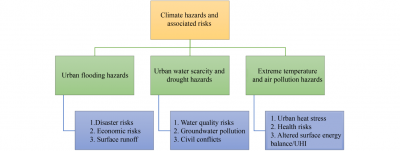With the intensification of global climate change, urban areas are facing increasingly severe environmental challenges, among which extreme heat and air pollution, as interrelated risks, pose significant threats to human health and urban infrastructure operation. However, research on the combined impacts of these two hazards and the effectiveness of local climate change adaptation strategies in addressing them remains insufficient, especially in the context of UK cities.
Therefore, Shefali CHAUHAN, Claire L. WALSH, Peter ECKERSLEY, Eugene MOHAREB, and Oliver HEIDRICH from institutions including Severn Trent Water (Previous Newcastle University), Newcastle University, Nottingham Trent University, and the University of Reading have jointly conducted a research entitled “Urban Heat Stress, Air Quality and Climate Change Adaptation Strategies in UK Cities”.
This study systematically analyzes air quality, ambient temperatures, and climate change adaptation plans in 30 UK cities. The research results show that London and Cambridge exhibit the highest risk of both extreme temperature and air pollution among the surveyed cities. These findings highlight the urgent need for standardized city-level hazard assessment and the integration of such assessments into local adaptation plans, which is of great practical significance for enhancing the climate resilience of UK cities and providing references for global urban climate adaptation efforts.
The paper “Urban heat stress, air quality and climate change adaptation strategies in UK cities” authored by Shefali CHAUHAN, Claire L. WALSH, Peter ECKERSLEY, Eugene MOHAREB, Oliver HEIDRICH. Full text of the open access paper: https://doi.org/10.1007/s42524-025-4029-y.
